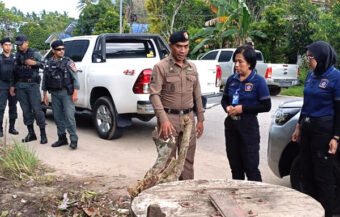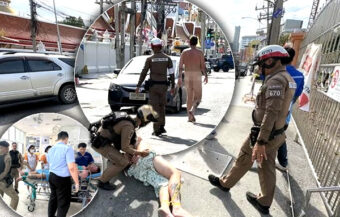Thai Airways returns to the Stock Exchange of Thailand on August 4 after a dramatic recovery from bankruptcy. Once grounded by ฿400bn in debt, the national carrier is now profitable, restructured and ready to reclaim its place not just in the skies but on the market.
In May 2020, Thai Airways crashed into bankruptcy, grounded by debts topping ฿400 billion and suspended from the Stock Exchange of Thailand (SET). As creditors circled, officials in Bangkok scrambled to shield the airline’s assets — including aircraft stranded at foreign airports. Fast forward to today, and the national carrier is back from the brink. A sweeping, court-supervised overhaul led by the Central Bankruptcy Court in Bangkok slashed debt, cut costs and put the airline back in the black. In June, the court lifted bankruptcy protection, declaring Thai Airways fit for flight once more. Profitable, leaner and refocused, the airline is ready to reclaim its place on the stock market. Trading resumes August 4 — and THAI is no longer flying on borrowed time.

The Stock Exchange of Thailand (SET) has approved Thai Airways International Plc’s (THAI) return to stock trading. The national carrier will officially resume trading on August 4, following years of restructuring and financial recovery.
Previously, THAI faced potential delisting due to severe financial losses. In 2020, its audited financial statements showed negative shareholders’ equity. As a result, the SET flagged the airline for removal from the trading board.
However, THAI soon entered a court-approved rehabilitation process. The Central Bankruptcy Court in Bangkok oversaw the airline’s turnaround strategy. Over several years, THAI worked to stabilise its finances, cut costs and repay creditors.
THAI cuts debt, slashes costs and rebuilds leadership team to deliver turnaround and operational recovery
As part of the plan, THAI restructured over ฿400 billion in debt. This figure included obligations to both domestic and international lenders. Moreover, the company reduced its workforce by half and trimmed its fleet substantially.
To lead the recovery, THAI brought in experienced executives. Former president Piyasvasti Amranand returned to chair the restructuring committee. Several veteran bankers also joined the effort to guide the airline through its crisis.
By 2023, the carrier began posting operating profits again. This marked a major milestone in its recovery. THAI continued strengthening its balance sheet and focusing on core markets.
On June 16, 2025, the Central Bankruptcy Court confirmed that THAI had fulfilled all rehabilitation conditions. Consequently, the airline formally requested reinstatement to the stock market.
At the same time, THAI agreed to comply with all SET regulations. In particular, the company accepted a one-year Silent Period rule. This rule prevents major shareholders from selling 55% of paid-up capital during the first year back.
SET lifts suspension and compliance warnings ahead of THAI’s official trading return on August 4
Following this request, the SET lifted two critical designations from THAI’s stock. First, it removed the “SP” symbol, which denotes trading suspension. Second, it lifted the “NC” sign, which marks non-compliance with financial rules.
Therefore, beginning August 4, THAI shares will trade again under the Services Industry Group. Specifically, they will appear within the Transportation and Logistics Sector on the SET.
To ensure transparency, the SET advised all investors to review THAI’s latest financial summary. The information is available through the SET’s online disclosure platform.
Notably, on the first day of trading, THAI shares will not follow standard price controls. There will be no ceiling or floor price limits applied that day. Additionally, dynamic price bands and auto-pause mechanisms will not be active. These controls will return on the following trading day.
Furthermore, THAI shares will rejoin the SET Index the next business day after trading resumes. This will increase the stock’s visibility among local and international investors.
CEO projects confidence as THAI eyes new growth while travel demand recovers across key global markets
According to THAI CEO Chai Eamsiri, the company is well-positioned for its return to the public market. In a recent statement, he emphasised confidence in THAI’s long-term business outlook.
Despite ongoing global uncertainty, Chai believes THAI remains resilient. For instance, he said the company is seeing steady demand from European travellers. Even in the off-season, bookings have remained strong.
Meanwhile, demand from Chinese passengers has stayed flat. Still, Chai downplayed the issue, noting THAI’s limited routes to China. He insisted that the airline is focused on its profitable core destinations.
In addition to passenger growth, THAI is exploring new investment opportunities. It is actively preparing to bid on the U-Tapao Maintenance, Repair and Overhaul (MRO) facility. This facility is located within Thailand’s Eastern Economic Corridor (EEC).
Previously, THAI was excluded from the project due to its no-longer-state-owned status. However, the MRO contract is now being re-tendered. As a result, THAI is ready to compete for it again.
Strategic EEC bid and multibillion-baht Boeing deal set stage for long-term investment and diplomacy
To strengthen its bid, THAI has partnered with Bangkok Airways. The joint venture is close to finalisation. Together, they are prepared to invest ฿10 billion in the MRO facility.
Chai described the EEC as a long-term opportunity for THAI. He said the partnership aligns with the company’s future growth strategy. The deal is expected to bolster THAI’s technical and maintenance capabilities.
Separately, the airline has made a major fleet investment. Last year, it placed an order for 45 Boeing 787-9 wide-body aircraft. It also secured purchase options for 35 additional jets.
This order supports THAI’s regional and long-haul expansion plans. Moreover, the airline views the Boeing deal as a diplomatic tool. Chai has urged Thailand’s trade negotiators to use the order as leverage in talks with the United States.
With recovery complete and market trust returning, THAI prepares for high-season investor attention and lift-off
THAI’s improved financial health and strategic planning mark a new era for the airline. It has emerged from crisis as a leaner, more focused carrier. Most importantly, it has regained the confidence of creditors, regulators and market watchers.
Thai Airways rules out direct flights to the US for now. Resurgent airline happy with network partners
Thai Airways files for bankruptcy and gets court protection here as heavyweights are brought on board
Now, as it returns to public trading, the company aims to rebuild investor trust. The timing coincides with Thailand’s high tourist season, which may offer a further boost in sentiment.
THAI’s journey from bankruptcy to profitability has been long and complex. However, with legal hurdles cleared and operations stabilised, the company is ready to fly high for investors in Bangkok again.
Join the Thai News forum, follow Thai Examiner on Facebook here
Receive all our stories as they come out on Telegram here
Follow Thai Examiner here
Further reading:
Thai Airways union protests government ‘interference’ in its recovery plan at a critical juncture.
People’s Party economic head questions the government’s plans for Thai Airways after new moves
Thai Airways to refloat on Stock Exchange in June 2025 with a renewed mission as national carrier
Passenger complaint turbulence as Thai Airways appears to plot sky-high Dreamliner expansion
Passengers to finally get refunds from high-flying Thai Airways still facing financial turbulence
Flying high at Thai Airways as numbers skyrocket as it flies tourists into the kingdom from Europe


















